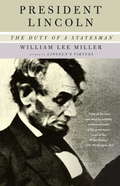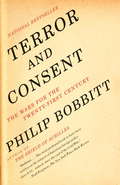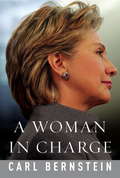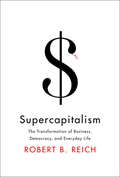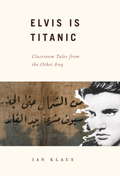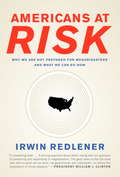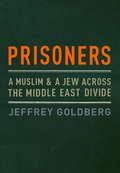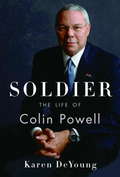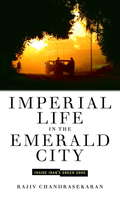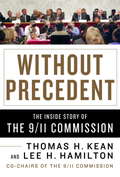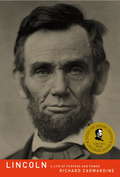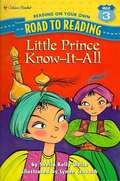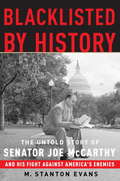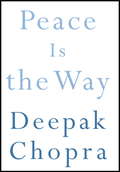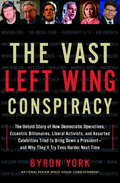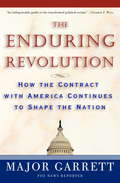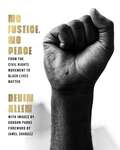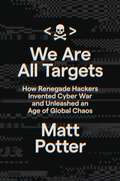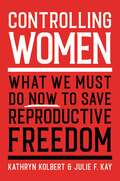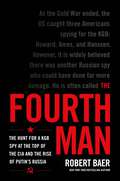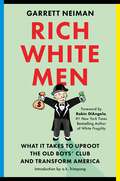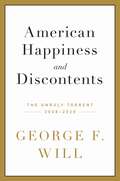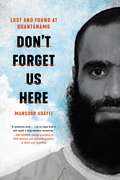- Table View
- List View
President Lincoln: The Duty Of A Statesman (Playaway Adult Nonfiction Ser.)
by William Lee MillerIn his acclaimed book Lincoln's Virtues, William Lee Miller explored Abraham Lincoln's intellectual and moral development. Now he completes his "ethical biography," showing how the amiable and inexperienced backcountry politician was transformed by constitutional alchemy into an oath-bound head of state. Faced with a radical moral contradiction left by the nation's Founders, Lincoln struggled to find a balance between the universal ideals of Equality and Liberty and the monstrous injustice of human slavery. With wit and penetrating sensitivity, Miller brings together the great themes that have become Lincoln's legacy--preserving the United States of America while ending the odious institution that corrupted the nation's meaning--and illuminates his remarkable presidential combination: indomitable resolve and supreme magnanimity.From the Trade Paperback edition.
Terror and Consent: The Wars for the Twenty-first Century
by Philip Bobbitt'A masterpiece and manual for our times ... Philip Bobbitt has drawn nothing less than a philosophical route-map for the war on terror and the geopolitical crises of the early 21st century' Matthew d'Ancona, Spectator. 'One of the most important books you are likely to read ... written with remarkable literary grace ... Bobbitt's work is in a class rather apart' Rowan Williams, Daily Telegraph. Almost every widely held idea we have about the war on terror is wrong, Philip Bobbitt argues, and must be rethought. It is not about religion, nationalism or a 'clash of civilizations'. Instead, we face the death of the nation-state and the birth of frontierless, globally networked 'states of terror' that seek to undermine an entire culture of political consent. This dramatic and highly acclaimed book tears down our assumptions to show that we are fighting a new kind of war - and how it can be won. 'The most important exploration of the changing relationship between war and terrorism to date. If you want to know what we will be debating in the coming years, read Bobbitt' John Gray. 'Sets out with clarity and courage the first really comprehensive analysis of the struggle against terror' Tony Blair. 'Bold new ideas ... fascinating ... his analysis goes to the heart of how we think about the structure of the modern world ... an extraordinary book' Rebecca Seal, Observer.
A Woman in Charge: The Life of Hillary Rodham Clinton
by Carl BernsteinA Woman in Charge reveals the true trajectory of Hillary's astonishing life and career. From a staunchly Republican household and apparently idyllic Midwestern girlhood - her disciplinarian father here revealed as harsher than she has acknowledged - we see the shaping of a brilliant girl whose curiosity was fuelled by the ferment of the 1960s and a desire to change the world. During her student years, she was already perceived as a spokeswoman for her generation. Then, at Yale Law School, she met and fell in love with Bill Clinton, cancelling her own dreams to tie her fortunes to his. Bernstein clarifies the often amazing dynamic of their marriage, charting both her political acumen and her blind spots, and untangling her relationship to the great controversies of Whitewater, Troopergate and Travelgate. And then, in the emotional and political chaos of the Lewinsky affair we see Hillary standing by her husband - evoking a rising wave of sympathy from a public previously cool to her and in effect, Bernstein argues, saving his presidency. It helps carry her into the Senate: her time has come. As she decides to run for President, this self-described 'mind-conservative and heart liberal' has one more chance to fulfill her long-deferred ambitions. Bernstein has interviewed some 200 of her colleagues, friends and enemies and was given unique access to the candid record of the 1992 presidential campaign kept by Hillary's best friend, Diane Blair. Marshalling all the skills and energy that propelled his history-making Pulitzer prize-winning coverage of Watergate, he gives us a detailed, sophisticated, comprehensive and revealing account of the complex human being and political meteor who has already helped define one presidency and may well become the woman in charge of another.
Supercapitalism: The Transformation of Business, Democracy, and Everyday Life
by Robert B. ReichFrom the greatly admired author of The Work of Nations and The Future of Success, one of America's greatest economic and political thinkers as well as a distinguished public servant in three national administrations, a breakthrough book on the clash between capitalism and democracy. Mid-twentieth-century capitalism has turned into global capitalism, and global capitalism--turbocharged, Web-based, and able to find and make almost anything just about anywhere--has turned into supercapitalism. But as Robert B. Reich makes clear in this eye-opening book, while supercapitalism is working wonderfully well to enlarge the economic pie, democracy--charged with caring for all citizens--is becoming less and less effective under its influence. Reich explains how widening inequalities of income and wealth, heightened job insecurity, and the spreading effects of global warming are the logical outcomes of supercapitalism. He shows us why companies, fighting harder than ever to maintain their competitive positions, have become even more deeply involved in politics; and how average citizens, seeking great deals and invested in the stock market to an unprecedented degree, are increasingly loath to stand by their values if it means biting the hands that feed them. He makes clear how the tools traditionally used to temper America's societal problems--fair taxation, well-funded public education, trade unions--have withered as supercapitalism has burgeoned. Reich sets out a clear course to a vibrant capitalism and a concurrent, equally vibrant democracy. He argues forcefully that the spheres of business and politics must be kept distinct. He calls for an end to the legal fiction that corporations are citizens, as well as the illusion that corporations can be "socially responsible" until laws define social needs. Reich explains why we must stop treating companies as if they were people--and must therefore abolish the corporate income tax and levy it on shareholders instead, hold individuals rather than corporations guilty of criminal conduct, and not expect companies to be "patriotic." For, as Reich says, only people can be citizens, and only citizens should be allowed to participate in democratic decision making.
Supercapitalism
by Robert B. ReichFrom one of America's foremost economic and political thinkers comes a vital analysis of our new hypercompetitive and turbo-charged global economy and the effect it is having on American democracy. With his customary wit and insight, Reich shows how widening inequality of income and wealth, heightened job insecurity, and corporate corruption are merely the logical results of a system in which politicians are more beholden to the influence of business lobbyists than to the voters who elected them. Powerful and thought-provoking, Supercapitalism argues that a clear separation of politics and capitalism will foster an enviroment in which both business and government thrive, by putting capitalism in the service of democracy, and not the other way around.From the Trade Paperback edition. even more deeply involved in politics; and how average citizens, seeking great deals and invested in the stock market to an unprecedented degree, are increasingly loath to stand by their values if it means biting the hands that feed them. He makes clear how the tools traditionally used to temper America's societal problems--fair taxation, well-funded public education, trade unions--have withered as supercapitalism has burgeoned. Reich sets out a clear course to a vibrant capitalism and a concurrent, equally vibrant democracy. He argues forcefully that the spheres of business and politics must be kept distinct. He calls for an end to the legal fiction that corporations are citizens, as well as the illusion that corporations can be "socially responsible" until laws define social needs. Reich explains why we must stop treating companies as if they were people--and must therefore abolish the corporate income tax and levy it on shareholders instead, hold individuals rather than corporations guilty of criminal conduct, and not expect companies to be "patriotic." For, as Reich says, only people can be citizens, and only citizens should be allowed to participate in democratic decision making.From the Hardcover edition.
Elvis Is Titanic
by Ian KlausIn the spring of 2005, Ian Klaus, a twenty-six-year-old Rhodes Scholar, traveled eight hours from Turkey, via broken-down taxi and armed convoy, to reach Salahaddin University in Arbil, the largest city in Iraqi Kurdistan. Elvis Is Titanic is the poignant, funny, and eye-opening story of the semester he spent there teaching U. S. history and English in the thick of the war for hearts and minds.
Americans at Risk
by Irwin RedlenerThis important book by one of our leading experts on disaster preparedness offers a compelling narrative about our nation’s inability to properly plan for large-scale disasters and proposes changes that can still be made to assure the safety of its citizens. Five years after 9/11 and one year after Hurricane Katrina, it is painfully clear that the government’s emergency response capacity is plagued by incompetence and a paralyzing bureaucracy. Irwin Redlener, who founded and directs the National Center for Disaster Preparedness, brings his years of experience with disasters and health care crises, national and international, to an incisive analysis of why our health care system, our infrastructure, and our overall approach to disaster readiness have left the nation vulnerable, virtually unable to respond effectively to catastrophic events. He has had frank, and sometimes shocking, conversations about the failure of systems during and after disasters with a broad spectrum of people—from hospital workers and FEMA officials to Washington policy makers and military leaders. And he also analyzes the role of nongovernmental organizations, such as the American Red Cross in the aftermath of Katrina. Redlener points out how a government with a track record of over-the-top cronyism and a stunning disregard for accountability has spent billions on “random acts of preparedness,” with very little to show for it—other than an ever-growing bureaucracy. As a doctor, Redlener is especially concerned about America’s increasingly dysfunctional and expensive health care system, incapable of handling a large-scale public health emergency, such as pandemic flu or widespread bioterrorism. And he also looks at the serious problem of a disengaged, uninformed citizenry—one of the most important obstacles to assuring optimal readiness for any major crisis. Redlener describes five natural and man-made disaster scenarios as a way to imagine what we might face, what our current systems would and would not prepare us for, and what would constitute optimal planning—for government and the public—in each situation. To see what could be learned from others, he points up some of the more effective ways countries in Europe, Asia, and the Middle East have dealt with various disasters. And he concludes with a real prescription: a nine-point proposal for how America can be better prepared as well as an addendum of what citizens themselves can do. An essential book for our time,Americans at Riskis a devastating and realistic account of where we stand today.
Prisoners: A Muslim and a Jew Across the Middle East Divide
by Jeffrey GoldbergJeffrey Goldberg moved from Long Island to Israel while still a college student. In the middle of the first Palestinian uprising in 1990, the Israeli army sent him to serve as a prison guard at Ketziot, the largest jail in the Middle East. Realizing that among the prisoners were the future leaders of Palestine, and that this was a unique opportunity to learn from them about themselves, he began an extended dialogue with a prisoner named Rafiq. This is an account of life in that harsh desert prison and of that dialogue--the accusations, explanations, fears, prejudices and aspirations each man expressed--which continues to this day. Prisoners is a remarkable book: spare, impassioned, energetic, and unstinting in its candour about both the darkness and the hope buried within the animosities of the Middle East.
Soldier: The Life of Colin Powell
by Karen DeyoungOver the course of a lifetime of service to his country, Colin Powell became a national hero, a beacon of wise leadership and, according to polls, "the most trusted man in America. " From his humble origins as the son of Jamaican immigrants to the highest levels of government in four administrations, he helped guide the nation through some of its most heart-wrenching hours. Now, in the first full biography of one of the most admired men of our time, award-winning Washington Post journalist Karen DeYoung takes us from Powell's Bronx childhood and meteoric rise through the military ranks to his formative roles in Washington's corridors of power and his controversial tenure as secretary of state. With psychological acumen and a reporter's eye for detail, DeYoung introduces us to the racially integrated neighborhood where Powell grew up, his courtship of and marriage to Alma Johnson, and his years as a promising young Army officer. We are witness to the pivotal events that helped shaped his world view, including two tours of duty in Vietnam, where he was disillusioned by a breakdown in leadership and the lack of a clear objective, and a 1988 meeting as President Reagan's national security adviser with Mikhail Gorbachev, who looked at him dead-on and effectively declared an end to the Cold War. We are privy to his reasoning as the architect of Operation Desert Storm and the chairman of the Joint Chiefs of Staff under George H. W. Bush and Bill Clinton, a position that made him a household name and an international celebrity. And we experience his agonizing deliberations in the face of a groundswell of public desire that he run for the presidency. Yet it was his capacity as America's chief diplomat in the administration of George W. Bush that brought Powell the most renown--and criticism. Charged with the formidable task of making the case for war with Iraq, he convinced a wary nation that it was both necessary and right, only to find his own credibility hanging in the balance as the justification for invasion began to unravel. At odds with the White House on a range of foreign policy issues, Powell's counsel went unheeded and his reputation was tarnished. With dramatic new information about the inner workings of an administration locked in ideological combat, DeYoung makes clearer than ever before the decision-making process that took the nation to war and addresses the still-unanswered questions about Powell's departure from his post shortly after the 2004 election. Drawing on interviews with U. S. and foreign sources as well as with Powell himself, and with unprecedented access to his personal and professional papers, Soldier is a revelatory portrait of an American icon: a man at once heroic and all-too-humanly fallible.
Green Zone: Imperial Life in the Emerald City
by Rajiv ChandrasekaranFrom inside a surreal bubble of pure Americana known as the Green Zone, the US-led Coalition Provisional Authority attempted to rule Iraq following the fall of Saddam Hussein's regime. Drawing on interviews and internal documents, Rajiv Chandrasekaran tells the memorable story of this ill-prepared attempt to build American democracy in a war-torn Middle Eastern country, detailing not only the risky disbanding of the Iraqi army and the ludicrous attempt to train the new police force, but absurdities such as the aide who based Baghdad's new traffic laws on those of the state of Maryland, downloaded from the net, and the twenty-four-year-old who had never worked in finance put in charge of revitalising Baghdad's stock exchange. Imperial Life in the Emerald City is American reportage at its best.
Imperial Life in the Emerald City
by Rajiv ChandrasekaranThe Green Zone, Baghdad, 2003: in this walled-off compound of swimming pools and luxurious amenities, Paul Bremer and his Coalition Provisional Authority set out to fashion a new, democratic Iraq. Staffed by idealistic aides chosen primarily for their views on issues such as abortion and capital punishment, the CPA spent the crucial first year of occupation pursuing goals that had little to do with the immediate needs of a postwar nation: flat taxes instead of electricity and deregulated health care instead of emergency medical supplies. In this acclaimed firsthand account, the former Baghdad bureau chief of The Washington Post gives us an intimate portrait of life inside this Oz-like bubble, which continued unaffected by the growing mayhem outside. This is a quietly devastating tale of imperial folly, and the definitive history of those early days when things went irrevocably wrong in Iraq.From the Trade Paperback edition.
Without Precedent
by Lee H. Hamilton Thomas H. Kean Benjamin RhodesIn the words of the commission’s co-chairmen, this is the compelling inside story of how the National Commission on Terrorist Attacks Upon the United States—more commonly known as the 9/11 Commission—managed to succeed against all odds in producing a report that made clear what went wrong and why. The mandate of the 9/11 Commission was daunting and all-encompassing. In its investigation of the events leading up to and including September 11, 2001, the commission had to examine U. S. diplomacy, military policy, intelligence agencies, law enforcement, border and aviation security, and congressional oversight, as well as the immediate response to the terrorist attacks, while also investigating the lethal enemy al Qaeda. The creation of the 9/11 Commission was blocked for months by the Bush administration, and after its inception in December 2002 the commission spent months mired in a series of controversies—the resignation of its first chairman, Henry Kissinger, and vice-chairman, George Mitchell; an inadequate budget; an extraordinarily polarized atmosphere leading up to the 2004 presidential election; the conflicting demands of various interest groups; the distrust of the victims’ families; difficulties in obtaining access to highly classified documents and to al Qaeda detainees; and a media eager to record stumbles and gaffes. The obstacles were great, and the expectations for a blue-ribbon panel are never high—yet somehow the 9/11 Commission overcame everything that might have thwarted it and succeeded beyond anyone’s greatest expectation, holding a series of hearings that riveted the nation, producing a unanimous and widely heralded report that became a national best seller, and issuing recommendations that led to the most significant reform of America’s national security agencies in decades. The 9/11 Commission report slaked the national thirst for accountability. Here for the first time is the story of how the commission came together to produce its landmark document.
Lincoln
by Richard CarwardineCarwardine (American history, Oxford U. ) received the Lincoln Award--the first British scholar to do so--for this biography, originally published in 2003 by Pearson/Longman. Half of it addresses Lincoln's (1809-65) career and the roots of his political ambition before he became president of the US. Annotation ©2006 Book News, Inc. , Portland, OR (booknews. com)
Little Prince Know-It-All
by Sheila Kelly WelchTwo popular themes -- pets and sibling rivalry -- come together in this slyly funny story about two little princes who compete to see who has the smarter pet.
Blacklisted by History: The Untold Story of Senator Joe McCarthy and His Fight Against America's Enemies
by M. Stanton EvansJournalist and commentator Evans assures his readers that McCarthy had access to information about communist infiltration of the US government and that his charges were based on fact. Evans's interpretation of archival material he understands to have been long forgotten or hidden indicates McCarthy was justified in conducting hearings and censuring individuals. Further, Evans believes the Truman and Eisenhower administrations and State Department officials lied about spies in their midst and ignored warnings by the FBI that individuals in key positions were secret communists. As he goes case by case, finding anomalies in records, Evans also claims that McCarthy was convinced by evidence that those he targeted were not victims but enemies, and that he was destroyed by a conspiracy that appears to extend to this day in history books. Annotation ©2008 Book News, Inc., Portland, OR (booknews.com)
Peace Is the Way
by Deepak ChopraDeepak Chopra's passionate new book, Peace Is the Way, was inspired by a saying from Mahatma Gandhi: "There is no way to peace. Peace is the way." In a world where every path to peace has proved futile, the one strategy that hasn't been tried is the way of peace itself. "We must not bring one war to an end, or thirty," Chopra tells us, "but the idea of war itself."How can this be done?By facing the truth that war is satisfying, and then substituting new satisfactions so that violence is no longer appealing. "War has become a habit. We reach for it the way a chain smoker reaches for a cigarette, promising to quit but somehow never kicking the habit." But Chopra tells us that peace has its own power, and our task now is to direct that power and multiply it one person at a time. Behind the numbing headlines of violence running out of control there are unmistakable signs of a change--Chopra believes that a majority of people are ready to see an end to war. "Right now 23 million soldiers serve in armies around the world. Can't we find ten times that number who will dedicate themselves to peace? A hundred times?"Peace Is the Way challenges each of us to take the next leap in personal evolution. "You aren't asked to be a saint, or to give up any belief. You are only asked to stop reacting out of fear, to change your allegiance from violence to peace." In a practical seven-step program, Chopra shows the reader how to become a true peacemaker. "Violence may be innate in human nature, but so is its opposite: love. The next stage of humanity, the leap which we are poised to take, will be guided by the force of that love." This is more than a hope or an aspiration. It is a new way of being in the world, giving each individual the power to end war in our time.From the Hardcover edition.
The Vast Left Wing Conspiracy
by Byron York“We have to fight back.” —Al FrankenThe Left is angry—angry at President George W. Bush, the war in Iraq, the “right-wing media,” and more. And as National Review investigative writer Byron York reveals in this stunning, meticulously reported book, liberal activists have harnessed that anger to build the biggest, richest, and best organized political movement in American history.Indeed, the Left’s failure to oust President Bush in 2004 has obscured the fact that this new movement has transformed American politics. York documents the staggering scope of liberals’ efforts—the record sums of money spent, the “shell game” financial maneuvers, the close coordination between “nonpartisan” groups and the Democratic Party, the revolutionary approaches to fund-raising and reaching out to voters, the pioneering use of movies and websites as campaign tools, and more.The Vast Left Wing Conspiracy provides a startling behind-the-scenes look at this powerful liberal movement. York brings the reader into secret powwows at Soros’s Hamptons estate, into the Chinese restaurant where MoveOn is born, to a gala event where Al Franken rants about the evils of the right wing, to fund-raisers where liberals openly mock the election laws they’re ignoring, to the movie premiere where Michael Moore is feted by top-ranking Democrats, into the Washington restaurant where Democratic operatives hatch their plan, and to many other spots along the way.One thing above all becomes clear: Despite their failure to win in 2004, liberals will only keep improving the well-oiled political machine they built.A Main Selection of the Conservative Book Club
The Enduring Revolution
by Major GarrettTo most observers--including many conservatives--the so-called Republican Revolution of 1994 was anything but revolutionary, and the Contract with America that propelled the GOP into power was just a gimmick. But in The Enduring Revolution, Fox News national reporter Major Garrett turns this conventional wisdom on its head, revealing how the Contract with America and the Republican Revolution have changed our lives in startling ways. The Republicans have fundamentally altered our approach to taxes, national defense, terrorism, welfare, entitlements, health care, education, abortion, gun control, and crime, among other issues. Quite simply, America is a vastly different place after the Contract than it was before it.If you think the 2004 elections re?ected a political realignment in this country, think again. That realignment occured a decade earlier; the Republicans' victory in 1994 made George W. Bush's election and reelection possible.Based on exclusive interviews with more than fifty key players from both sides of the aisle, and complete with more than thirty pages of crucial, previously unpublished confidential documents, The Enduring Revolution offers the dramatic behind-the-scenes story of how the Contract with America came into being and how this one document has defined American politics for a decade. Garrett's exhaustive research and remarkable access enable him to tell a story that will surprise even the most seasoned political observers. In The Enduring Revolution, you'll learn: *How George W. Bush and John Kerry built much of their 2004 presidential campaigns around the Contract with America*How conservatives angered by the recent growth of the federal government have overlooked critical Republican victories on spending*How Bill Clinton's supposed great achievements, welfare reform and a balanced budget, resulted directly from the Contract with America--and actually reflected his weakness as a leader*How the Republican majority made the 2003 Iraq invasion possible years before our military campaign began*How our intelligence community's problems in the War on Terror would have been much worse had there been no Republican RevolutionUndeniably, Republican leaders from Newt Gingrich to Dennis Hastert have made critical mistakes--and Garrett provides the inside story on how and why those failures occurred. But he also reveals how the usual focus on setbacks ignores the jaw-dropping changes the Contract with America has produced.The Enduring Revolution is a stunning reassessment of a crucial but misunderstood episode in our political history.From the Hardcover edition.
No Justice, No Peace: From the Civil Rights Movement to Black Lives Matter
by Devin AllenNautilus Book Awards' Better Books for a Better WorldA Movement in Words and Images Award-winning photographer Devin Allen has devoted the last six years to documenting the protests of the Black Lives Matter movement, from its early days in Baltimore, Maryland, up to the present day. The riveting images in No Justice, No Peace provide a lens on the resistance that has empowered Black lives generation after generation. Allen&’s signature black-and-white photos bear witness to the profound history of African Americans and allies in the fight for social justice and portray the collective action over decades in stunning, timeless portraits. Allen&’s remarkable photos of today&’s Black Lives Matter protests, which have been featured in the New York Times, the Washington Post, and twice on the cover of Time magazine, were inspired by Gordon Parks of the Civil Rights Movement, and create a vision of the past and future of Black activism and leadership in America. With contributions from twenty-six bestselling and influential writers and activists of today such as Clint Smith, DeRay Mckesson, D. Watkins, Jacqueline Woodson, Emmanuel Acho, Keeanga-Yamahtta Taylor, and more, alongside the words of past writers and activists such as Martin Luther King Jr, Frederick Douglass, Malcolm X, Maya Angelou, and John Lewis, No Justice, No Peace is a reminder of the moral responsibility of Americans to break unjust laws and take direct action. In words and pictures, No Justice, No Peace honors the connection between activism today and that of the past. If indeed hindsight is 20/20, this artistic look back is a lens on history that enlarges our understanding of the lasting predicament of racism in the United States of America. At once deeply intimate and profoundly uplifting, No Justice, No Peace is a visual tribute to Black resistance and a stern missive on the tough, but necessary, road that lies ahead.
We Are All Targets: How Renegade Hackers Invented Cyber War and Unleashed an Age of Global Chaos
by Matt PotterThe incredible untold origin story of cyberwar and the hackers who unleashed it on the world, tracing their journey from the ashes of the Cold War to the criminal underworld, governments, and even Silicon Valley. Two years before 9/11, the United States was attacked by an unknown enemy. No advance warning was given, and it didn't target civilians. Instead, tomahawk missiles started missing their targets, US agents were swept up by hostile governments, and America&’s enemies seemed to know its every move in advance. A new phase of warfare—cyber war—had arrived. And within two decades it escaped Pandora's Box, plunging us into a state of total war where every day, countless cyber attacks perpetrated by states and mercenaries are reshaping the world. After receiving an anonymous email with leaked NATO battle plans during the bombardment of Kosovo, journalist Matt Potter embarked on a twenty-year investigation into the origins of cyber war and how it came to dominate the world. He uncovered its beginnings – worthy of a Bond movie – in the last days of the Cold War, as the US and its allies empowered a generation of Eastern European hackers, only to wake up in the late 90s to a new world order. It's a story that winds through Balkan hacking culture, Russia, Silicon Valley, and the Pentagon, introducing us to characters like a celebrity hacker with missing fingers who keeps escaping prison, FBI agents chasing the first generation of cyber mercenaries in the 90s, tech CEOs, and Russian generals obsessed with a Cold War rematch. Never before told, this is the riveting secret history of cyberwar not as governments want it to be – controlled, military-directed, discreet, and sophisticated – but as it really is: anarchic, chaotic, dangerous, and often thrilling.
Controlling Women: What We Must Do Now to Save Reproductive Freedom
by Kathryn Kolbert Julie F. KayFrom two lawyers at the forefront of the reproductive rights movement, this fully updated book shares bold strategies meant to help restore and expand reproductive and sexual rights. Reproductive freedom has never been in more dire straits. Roe v. Wade protected abortion rights and Planned Parenthood v. Casey unexpectedly preserved them. Yet in the following decades these rights have been gutted by restrictive state legislation, the appointment of hundreds of anti-abortion judges, and violence against abortion providers. Today, the ultra-conservative majority at the Supreme Court has overturned our most fundamental reproductive protections. With Roe toppled, abortion is now a criminal offense in nearly one-third of the United States. At least six states have enacted bans on abortion as early as six weeks of pregnancy—before many women are even aware they are pregnant. Today, 89% of U.S. counties do not have a single abortion provider, in part due to escalating violence and intimidation aimed at disrupting services. We should all be free to make these personal and private decisions that affect our lives and wellbeing without government interference or bias, but we can no longer depend on Roe v. Wade and the federal courts to preserve our liberties. Legal titans Kathryn Kolbert and Julie F. Kay share the story of one of the most divisive issues in American politics through behind-the-scenes personal narratives of stunning losses, hard-earned victories, and moving accounts of women and health care providers at the heart of nearly five decades of legal battles. Kolbert and Kay propose audacious new strategies inspired by medical advances, state-level protections, human rights models, and activists across the globe whose courage and determination are making a difference. No more banging our heads against the Court&’s marble walls. It is time for a new direction.
The Fourth Man: The Hunt for a KGB Spy at the Top of the CIA and the Rise of Putin's Russia
by Robert BaerThe explosive, never-before-told story of the thrilling hunt for a KGB spy in the top ranks of the CIA, revealing how spies blinded the US to the rise of Putin and Russia&’s dangerous future, from New York Times bestselling author and former CIA officer Robert Baer We think we know all the Cold War&’s greatest spy stories. The tales of America&’s greatest traitors have been told over and over. However, the biggest story of them all remains untold—until now. Rumors have long swirled of another mole in American intelligence, one perhaps more damaging than all the others combined. Perhaps the greatest traitor in American history, perhaps a Russian ruse to tear the CIA apart, or perhaps nothing more than a bogeyman, he is often referred to as the Fourth Man. Blowing the lid off the biggest spy story in decades, Robert Baer tells the full, gripping story for the first time. After arrest of KGB spy Aldrich Ames, the CIA launched another investigation to make sure there wasn't another double agent in its ranks. Led by three of the CIA&’s best spy hunters, women who devoted their lives to counterintelligence, its existence was known only to a few. They began methodically investigating their own bosses and colleagues, turning up loose threads, suspicious activity, and shocking intelligence from the CIA&’s best Russian asset. In the end, they came to a startling conclusion that, whether true or not, would shake American intelligence to its core, setting the stage for a cat-and-mouse game with enormous geopolitical stakes. Spies and moles may seem like bygone cold war history, but with Russia again a misunderstood belligerent power, the skeletons America would rather keep hidden are emerging, and as Robert Baer shows in this thrilling masterwork of investigative reporting, they matter as much now as ever.
Rich White Men: What It Takes to Uproot the Old Boys' Club and Transform America
by Garrett NeimanWith a foreword by New York Times bestselling author Robin DiAngelo, this provocative book investigates major corporate boardrooms and presents a data-driven analysis of how rich white men have preserved their monopoly on power—and what we can do to stop them. It&’s no secret that our country has a serious problem when it comes to wealth inequality – and systemic racism and patriarchy have only exacerbated the advantages of wealthy white men. Over the past three decades, America&’s richest white men have only become richer, while those suffering in poverty have only gotten poorer. The divide may seem too great to bridge, but Rich White Men exposes the hidden and insidious ways that white male elites inherit, increase, and preserve their status—and, in this book, we get clear on how to uproot their monopoly on power. Serial nonprofit entrepreneur Garrett Neiman&’s day job is to get rich white men to donate money to good causes and organizations. In Rich White Men, Neiman brings us into corner offices of billionaires and the boardrooms of Goldman Sachs, McKinsey, Stanford, Harvard, and other enclaves of silver-spooned white men to illuminate the role of rich white men in the world and how they justify inequality. He uses the analogy of compound interest to illustrate how the advantages wealthy white men inherit give them a leg up at key moments in their lives, gilding their trajectories and shutting others out. Through this rare, insider access, readers will discover new ways to persuade the elite toward progressive solutions. A hopeful polemic, the book sheds light on dark truths about inequality and the people invested in preserving it while also providing a blueprint for how America can become an equitable democracy.Rich White Men reveals that to realize America&’s founding aspiration of life, liberty, and the pursuit of happiness, we must recognize, dismantle, and transform our current system into one that liberates us all – including this nation&’s morally and spiritually impoverished wealthy white men.
American Happiness and Discontents: The Unruly Torrent, 2008-2020
by George F. WillExamine the ways in which expertise, reason, and manners are continually under attack in our institutions, courts, political arenas, and social venues with this collection from the Pulitzer Prize-winning conservative columnist. George F. Will has been one of this country&’s leading columnists since 1974. He won the Pulitzer Prize for it in 1977. The Wall Street Journal once called him &“perhaps the most powerful journalist in America.&” In this new collection, he examines a remarkably unsettling thirteen years in our nation&’s experience, from 2008 to 2020. Included are a number of columns about court cases, mostly from the Supreme Court, that illuminate why the composition of the federal judiciary has become such a contentious subject. Other topics addressed include the American Revolutionary War, historical figures from Frederick Douglass to JFK, as well as a scathing assessment of how State of the Union Addresses are delivered in the modern day. Mr. Will also offers his perspective on American socialists, anti-capitalist conservatives, drug policy, the criminal justice system, climatology, the Coronavirus, the First Amendment, parenting, meritocracy and education, China, fascism, authoritarianism, Frank Sinatra, Bob Dylan, The Beach Boys, and the morality of enjoying football. American Happiness and Discontents: The Unruly Torrent, 2008-2020 is a collection packed with wisdom and leavened by humor from one the preeminent columnists and intellectuals of our time.
Don't Forget Us Here: Lost and Found at Guantanamo
by Mansoor AdayfiThis moving, eye-opening memoir of an innocent man detained at Guantánamo Bay for fifteen years tells a story of humanity in the unlikeliest of places and an unprecedented look at life at Guantánamo.At the age of 18, Mansoor Adayfi left his home in Yemen for a cultural mission to Afghanistan. He never returned. Kidnapped by warlords and then sold to the US after 9/11, he was disappeared to Guantánamo Bay, where he spent the next 15 years as Detainee #441.Don't Forget Us Here tells two coming-of-age stories in parallel: a makeshift island outpost becoming the world's most notorious prison and an innocent young man emerging from its darkness. Arriving as a stubborn teenager, Mansoor survived the camp's infamous interrogation program and became a feared and hardened resistance fighter leading prison riots and hunger strikes. With time though, he grew into the man prisoners nicknamed "Smiley Troublemaker": a student, writer, and historian. With unexpected warmth and empathy, he unwinds a narrative of fighting for hope and survival in unimaginable circumstances, illuminating the limitlessness of the human spirit. And through his own story, Mansoor also tells Guantánamo's story, offering an unprecedented window into one of the most secretive places on earth and the people—detainees and guards alike—who lived there with him. Twenty years later, Guantánamo remains open, and at a moment of due reckoning, Mansoor Adayfi helps us understand what actually happened there—both the horror and the beauty—a vital chronicle of an experience we cannot afford to forget.
